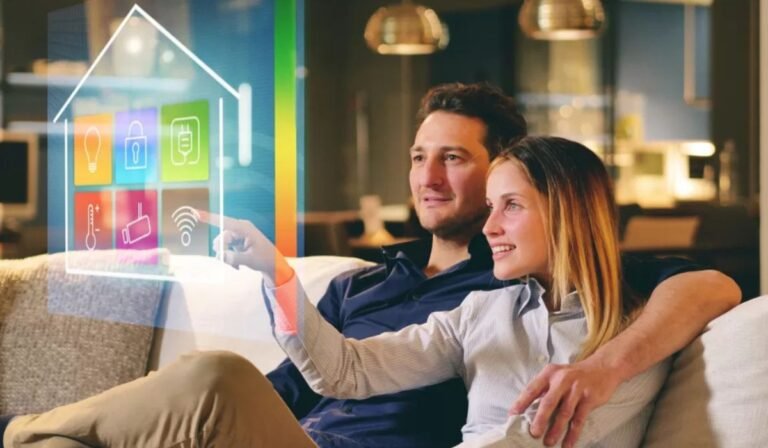Smart technology is revolutionizing rental property management, enhancing convenience, energy efficiency, and safety. Landlords and property managers are adopting digital tools like keyless entry systems and smart thermostats, attracting modern renters who value tech-integrated living spaces. This proactive approach reduces operating costs and increases property value.
As tenant expectations rise and property management companies compete in a digital-first market, integrating smart technology into rental properties redefines the standard for rentals. Modern landlords and property managers are using property management services to help implement these technologies, ensuring operational efficiency and a better tenant experience.
Smart tech is improving tenant convenience, adding value to properties, and increasing operational oversight for landlords. Whether seasoned or new, integrating smart devices with property management services can make units competitive, secure, and efficient, while reducing costs and streamlining operations.
Enhancing Security with Smart Locks
Security is a top priority for both landlords and tenants. Smart locks provide a keyless entry option, eliminating the need for physical keys that can be easily lost or copied. Tenants can enter their home using smartphone apps, PIN codes, or even biometric features, making daily access easier while increasing overall security.
Landlords can generate unique entry codes for guests, maintenance staff, or cleaners, then revoke access instantly to uphold tenant safety. Systems from trusted brands like Yale or Schlage work as standalone units or integrate seamlessly with other home security systems. Additionally, smart locks maintain an audit trail, logging each time the door is accessed, enhancing oversight and giving peace of mind to property owners and tenants.
Boosting Energy Efficiency with Smart Thermostats
Rising utility costs make energy efficiency a major consideration for renters. Smart thermostats allow tenants to monitor and optimize their heating and cooling usage through intuitive mobile interfaces. These devices learn user preferences and adjust temperatures automatically, significantly reducing energy waste.
For landlords, remote thermostat management means protecting vacant properties from issues like frozen pipes in winter or excessive humidity in summer. Services like Hamden CT property management often leverage these technologies to enhance property oversight and tenant satisfaction. By tracking historical energy data, tenants and landlords can identify patterns and make more informed decisions about consumption, fostering transparency and trust.
Improving Tenant Experience with Smart Lighting
Smart lighting systems add a layer of comfort and personalization to rental units. Using smartphone apps or voice commands, tenants can tailor lighting scenes for reading, entertaining, or sleeping activities. This adaptability also boosts security through programmed routines that mimic occupancy, discouraging break-ins when units are empty.
Energy savings are another advantage—many smart lighting products rely on highly efficient LEDs, which use a fraction of the energy of traditional bulbs. Lower utility bills and a more pleasant living environment can directly impact tenant satisfaction and retention.
Preventing Damage with Smart Water Leak Detectors
Undetected water leaks are a major source of property damage and costly repairs. Smart water leak detectors use sensors to monitor high-risk areas—such as under sinks, near washing machines, and along water heaters—for signs of leaks or moisture.
When a leak is detected, tenants and landlords receive instant app notifications or email alerts. Some advanced devices can shut off the water supply automatically, minimizing damage and expenses. Installing these sensors demonstrates a proactive approach to property care and reassures tenants that the landlord values their comfort and safety.
Streamlining Operations with Property Management Software
Property management software is revolutionizing how rental businesses handle day-to-day tasks. Integration with smart home technology allows landlords to schedule maintenance remotely, collect rent, and process lease renewals with minimal manual intervention. Automated maintenance alerts reduce oversight lapses, and centralized communication platforms make tenant interactions straightforward and professional.
The combination of software and smart devices saves time, lowers the risk of administrative errors, and ensures maintenance issues are handled quickly, supporting a smoother property management process.
Attracting Tenants with Virtual Tours
Virtual tours have become indispensable, especially in an era when digital experiences are prioritized. These interactive walkthroughs allow prospective renters to assess a property from anywhere in the world, reducing the reliance on in-person showings and speeding up leasing decisions.
Landlords can highlight smart features and unique amenities during the tour, helping their rental stand out in a crowded market. Virtual tours are also ideal for out-of-state or international renters who need assurances about property condition and layout before committing to a lease.
Overcoming Challenges in Smart Technology Integration
Adopting smart devices in rental properties can be challenging due to upfront installation costs, compatibility issues, and tenant training. However, as demand increases and smart technologies become more user-friendly, these obstacles are expected to decrease. Early adoption by landlords positions them ahead and demonstrates their properties are designed for modern living.
The rental market is shaped by technology and consumer expectations for connectivity, security, and comfort. Investing in smart technology helps future-proof businesses and creates safer, more appealing homes for tenants.
